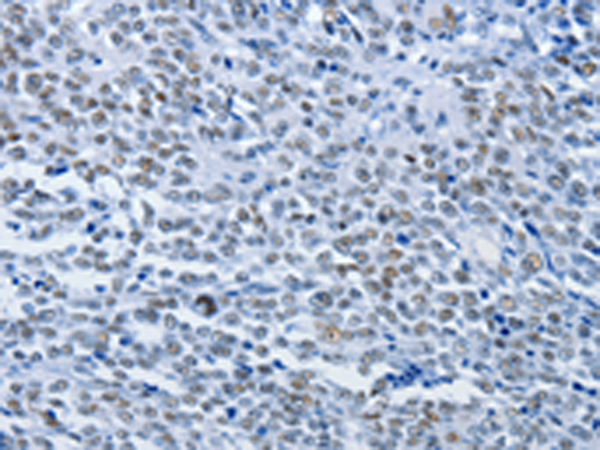
| WB | 咨询技术 | Human,Mouse,Rat |
| IF | 咨询技术 | Human,Mouse,Rat |
| IHC | 1/15-1/50 | Human,Mouse,Rat |
| ICC | 技术咨询 | Human,Mouse,Rat |
| FCM | 咨询技术 | Human,Mouse,Rat |
| Elisa | 1/1000-1/2000 | Human,Mouse,Rat |
| Aliases | CBX; M31; MOD1; p25beta; HP1-BETA; HP1Hsbeta; HP1Hs-beta |
| Host/Isotype | Rabbit IgG |
| Antibody Type | Primary antibody |
| Storage | Store at 4°C short term. Aliquot and store at -20°C long term. Avoid freeze/thaw cycles. |
| Species Reactivity | Human, Mouse |
| Immunogen | Synthetic peptide of human CBX1 |
| Formulation | Purified antibody in PBS with 0.05% sodium azide and 50% glycerol. |
+ +
以下是关于CBX1抗体的3篇代表性文献示例(内容基于公开研究整理,仅供参考):
---
1. **文献标题**:*"Characterization of a novel monoclonal antibody against CBX1 for chromatin interaction studies"*
**作者**:Li, Y. et al.
**摘要**:本研究开发了一种针对人源CBX1蛋白的新型单克隆抗体,并通过免疫印迹(Western blot)和免疫荧光验证其特异性。该抗体成功用于染色质免疫沉淀测序(ChIP-seq),揭示了CBX1在维持异染色质稳定性中的关键作用,尤其在端粒区域的富集模式。
---
2. **文献标题**:*"CBX1 mediates transcriptional silencing through HP1 interaction in cellular senescence"*
**作者**:Zhang, R. et al.
**摘要**:通过使用特异性CBX1抗体,本研究证实了CBX1通过与HP1蛋白互作调控细胞衰老相关基因的沉默。抗体在免疫共沉淀(Co-IP)和组织芯片(TMA)分析中的应用,揭示了CBX1在衰老细胞中表达上调,并与肿瘤抑制通路相关。
---
3. **文献标题**:*"Loss of CBX1 impairs embryonic stem cell differentiation by disrupting PRC1 complex integrity"*
**作者**:Fuchs, A. et al.
**摘要**:利用CBX1抗体进行免疫荧光和流式细胞术分析,研究发现CBX1缺失导致Polycomb抑制复合体1(PRC1)功能异常,从而影响胚胎干细胞向中胚层分化的能力。抗体特异性验证显示其适用于多种模式生物的样本。
---
**提示**:
如需具体文献,建议在PubMed或Google Scholar中搜索关键词“CBX1 antibody”、“HP1β (CBX1)”、“Chromobox homolog 1”等,并筛选涉及抗体开发、验证或应用的实验性论文。近年研究(2015年后)可能更侧重功能机制与疾病关联。
The CBX1 antibody targets the Chromobox Homolog 1 (CBX1) protein, a member of the chromobox family involved in epigenetic regulation and chromatin organization. CBX1. also known as HP1β (Heterochromatin Protein 1 beta), is a key component of heterochromatin, playing a critical role in gene silencing, genome stability, and chromatin compaction. It contains a conserved chromodomain that binds to trimethylated lysine 9 on histone H3 (H3K9me3), a hallmark of transcriptionally repressive heterochromatin. This interaction facilitates the recruitment of chromatin-modifying complexes to specific genomic regions, ensuring proper gene expression patterns and maintaining cellular identity.
CBX1 is essential for processes like X-chromosome inactivation, telomere maintenance, and DNA repair. Dysregulation of CBX1 has been linked to cancers, developmental disorders, and aging-related diseases, underscoring its biological significance. Researchers use CBX1 antibodies in techniques such as chromatin immunoprecipitation (ChIP), immunofluorescence, and Western blotting to study heterochromatin dynamics, epigenetic inheritance, and CBX1's interplay with other regulatory proteins (e.g., SUV39H1. TRIM28). These studies help elucidate mechanisms underlying diseases and potential therapeutic targets. As part of the broader Polycomb and HP1 protein networks, CBX1 antibodies are vital tools for exploring the interface between chromatin structure and cellular function.
×